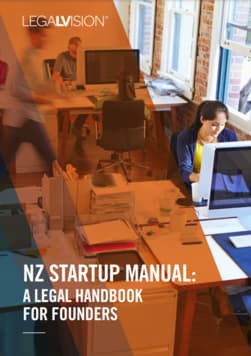Before you open your startup business to the public, there are several legal documents that you need to prepare first. These documents will ensure that you can adequately protect your new business, and that it follows all legal requirements in New Zealand. Therefore, this article will outline what legal documents are vital for you and your business.
Employment Agreements
If you plan to employ workers for your business, you must draft and prepare employment agreements. Generally, these set out the employment terms and conditions. Accordingly, each employee must have a written employment contract.
An employment agreement must include the:
- name of employer and employee;
- job description;
- location of the workplace;
- number of hours or days they will work;
- wage or salary amount and how this will be paid – the wage or salary amount must be equal to or greater than the minimum wage requirements;
- statement of how you will solve employment relationship issues;
- leave entitlements;
- dismissal provisions; and
- redundancy entitlements.
Non-Disclosure Agreement
When starting your business, you may choose to share confidential information with parties such as suppliers, investors or future partners. Therefore, you should keep in mind that through a non-disclosure agreement (NDA), you can prevent others from leaking your company’s confidential information to competitors. To that end, this confidentiality agreement is mainly used to protect ideas, processes and company knowledge.
Therefore, you will need to be specific about what confidential information means in your agreement for it to be legally binding. Evidently, the courts may not enforce your agreement if you define confidential information too broadly or unreasonably. For instance, the information you want to protect cannot already be public knowledge.
Continue reading this article below the formIP Assignment Deed
An IP assignment agreement or deed can transfer all intellectual property from the founders to the company itself to ensure the company owns the intellectual property relevant to the business. As a result, this may also attract more investments, as banks and investors will feel more secure investing in your startup if they have certainty that your company actually owns all intellectual property relating to the business. Importantly, this step is essential in the startup phase as it will prevent any future challenges, especially if your business has several co-founders.

Essential reading for anyone building their startup. This free guide includes practical advice and seven real-life case studies.
Trade Mark Registration
By registering your startup’s trade mark, you can strengthen and protect your brand from competitors who will not be able to imitate it. Additionally, through trade mark registration, you can distinguish your goods or services from other products in the market. Thus, you will need to make an application to the Intellectual Property Office of New Zealand to register your trade mark. Your trade mark can consist of:
- words;
- logos;
- shapes;
- colours;
- sounds;
- smells; or
- any combination of the above.
Shareholders Agreement
If your new startup is a company with more than one shareholder, you should consider putting in place a shareholders agreement. This is a confidential contract between the shareholders of your company which regulates the relationship between the shareholders. Once the agreement has been signed, it will be legally binding. Moreover, the agreement will likely include matters such as:
- pre-emptive rights;
- voting rights;
- dispute resolution;
- shareholders rights;
- buy-sell clauses (how remaining shareholders can buy exiting shareholder’s shares);
- what business decisions need shareholder approval; and
- how a shareholder can sell or purchase more shares.
Company Constitution
While not compulsory, your startup company should also consider adopting a constitution. Without a constitution, the default rules set out in the Companies Act will apply. Therefore, a constitution ensures a company can benefit from a broader range of powers than it would otherwise have under the Act alone.
The constitution may include the following:
- appointment and removal of directors;
- how shares can be issued or transferred;
- how decisions are made; and
- how meetings should be held.
Key Takeaways
There are several legal documents that you should consider having for your startup. Startup documents such as employee contracts are critical if you have employees. Additionally, while some documents such as a company constitution and shareholders agreement are optional, they can be beneficial. Finally, legal documents help protect your startup and ensure that business activities can operate smoothly. The documents you need will also depend on the business structure you choose for your startup. Before you draft up such documents, you should obtain legal advice. If you need assistance in preparing legal documents for your startup, our experienced startup lawyers can help you as part of our LegalVision membership. For a low monthly fee, you will have unlimited access to lawyers who can answer your questions and draft and review your documents. Call us today on 0800 005 570 or visit our membership page.
Frequently Asked Questions
Although not compulsory, your company should consider adopting a constitution. If the company has more than one shareholder, it should also establish a shareholders agreement. If your company does not have a constitution, the default rules in the Companies Act will apply.
An employment agreement is a legal document that sets out the employee’s terms and conditions of work. As the employer and the employee, both of you need to sign it, and you must have one for each employee.
We appreciate your feedback – your submission has been successfully received.












